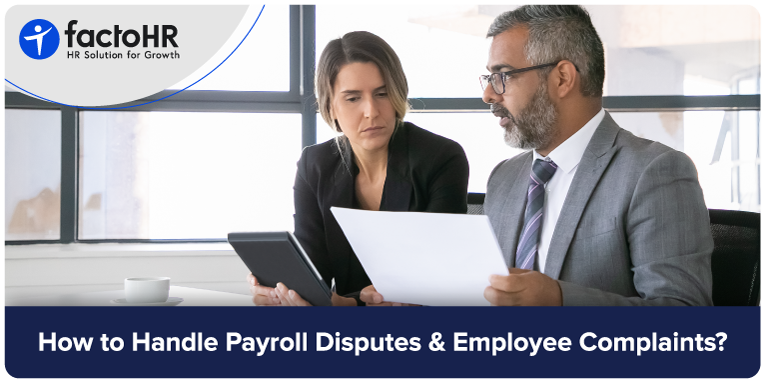How to Handle Payroll Disputes and Employee Complaints?

Table of Contents
Let’s say a few employees receive late salaries. They raised a concern, and no one reciprocated their complaints. This increases frustration among employees because a delay in payroll can disrupt an employee’s financial management. For instance, this could result in delayed EMI payments, late rent payments, and postponed grocery shopping.
Employees’ frustration turns into distrust not just in HR, but also in the organization. This is not an exaggeration – payroll disputes, if ignored or mismanaged, can erode the foundation of workplace trust. Addressing payroll disputes and employee complaints fairly is not just the best practice; it’s a business obligation.
This blog will outline the strategies to follow when addressing payroll disagreements and employee complaints.

Top Tips for Effortlessly Managing Payroll Disputes and Employee Complaints
With the right strategies and systems, companies can solve complex payroll disputes efficiently and maintain a healthy work culture. The following are the top strategies to counter employee complaints in payroll management.
Establish Clear Communication Channels
A clear channel for communication is the initial way to prevent disputes. A lack of knowledge among employees about how to file a complaint is a primary reason for payroll disputes. Therefore, companies must:
- Establish a dedicated point of contact (POC) for handling complaints. The mode of contact can be an email address, an online application from the HRMS software, or chatbots.
- Maintain an anonymous feedback mechanism for sensitive issues.
- Train employees about the reporting process during onboarding and in policy documents.
Address Complaints Promptly and Fairly
Payroll disputes should be given priority, as timely resolution ensures employee satisfaction and also maintains payroll compliance and organizational credibility. It is important to address payroll complaints quickly and fairly. By ignoring a complaint, a company seems indifferent to employees’ concerns. To see that disputes are settled on time and without bias:
- Reply to every complaint within 24 to 48 hours.
- Do not form a bias when investigating.
- Regardless of one’s post or position, equality should be practiced among all employees.
- Keep respective employees in the loop during the complaint resolution process.
A responsive approach will improve employee satisfaction and build a culture of trust.
Document All Complaints and Actions Taken
Documentation helps maintain consistency, ensure protection, and facilitate continuous improvement. Every dispute should be recorded, along with the following information:
- People Involved
- Date and nature of complaint
- Steps taken in the investigation
- Communication exchanged
- Final resolution
An auditable trail makes sure that decisions are logical in the event of legal scrutiny and helps identify patterns that could indicate systemic issues.
Foster a Positive and Respectful Workplace
The foundation of the organization should be rooted in mutual respect, transparency, and empathy. The volume of complaints and disputes decreases if the foundation is in place. To build a positive and respectful workplace, employers should:
- Conduct regular feedback sessions for query resolution
- Promote mutual respect among employees and across departments
- Fairly praise the work of the employee to boost their morale
- Imbibe the quality of active listening in managers
When employees are praised and supported by their managers, they work harder and strive to push their limits, becoming more productive.
Repercussions and Dismissals
Some complaints reveal matters such as misconduct, fraud, or negligence. In those cases, the organization should handle it with both decisiveness and ethics. Before any disciplinary action is taken:
- Ensure that proper inquiry procedures have been followed.
- Provide the employee a chance to present their perspective.
- Refer to the employee handbook or code of conduct as the guiding framework for this process.
- Document every action for this process for legal protection.
Wrongful termination or unfair punitive actions can not only damage morale but also open the company to legal risk and reputational harm.
Exhibit Transparency
Most payroll disputes occur because of misunderstandings about the pay and deductions, not due to any fundamental mistake. If the company makes its payroll structure clear, employees will have more trust and confidence in it. Employers should:
- Share a detailed salary breakup during onboarding
- Consistently update employees about changes in compensation policies
- Avoid jargon in payslips and policy documents
- Conduct periodic sessions to explain common payroll-related queries
Once the employees understand the salary structure, they are less likely to feel cheated or raise unwanted complaints.
Seek Professional Help when Necessary
Sometimes, the internal HR or finance team might not have the bandwidth or expertise to resolve complex payroll disputes. In such cases, it’s smart and safe to seek external help.
Consider hiring:
- Payroll consultants will audit systems for accuracy.
- Mediators to resolve high-stakes interpersonal conflicts.
- Labor law experts will ensure legal compliance in sensitive dismissals.
Consulting experts is one of the best ways to save your company from unwanted lawsuits.

Conclusion
Common payroll mistakes, such as incorrect tax deductions and untimely payment of bonuses, could make employees feel less satisfied. Therefore, an ethical organization is a reflection of sound payroll software. Every issue in the payroll is an opportunity for the HR department to demonstrate that employees are valued.
How an employer handles these concerns affects how employees regard their leaders, perceive fairness, and view the company’s future. Ultimately, a positive workplace environment is built on the foundation of accountability, respect, and trust.
Organizations that handle payroll disputes fairly not only cause fewer problems but also make employees more interested and happy at work. This helps keep good workers for longer and protects the company’s good name..
Grow your business with factoHR today
Focus on the significant decision-making tasks, transfer all your common repetitive HR tasks to factoHR and see the things falling into their place.

© 2026 Copyright factoHR


